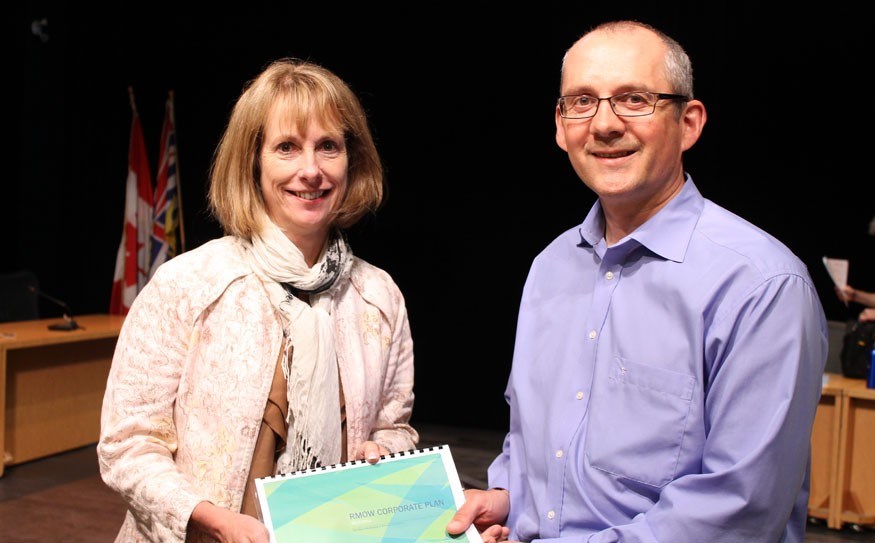Municipal CAO Mike Furey is so committed to building the community's trust in the local government, he's written it into the municipality's new corporate plan as one of the key corporate goals.
It's right up there on the list of six goals, "that the community has a high level of trust in local government and leadership" along with maintaining corporate financial health, providing excellence in facility and infrastructure management, supporting an exceptional resort experience, exceptional customer service and careful stewardship of the resort's natural assets.
"I think it's really important that the community have a high level of trust in the organization because I think we have to have trust to be effective and for people to have confidence that we're carrying out our responsibilities with due diligence and in a straight-forward and honest fashion, which I believe we are," said Furey in a media briefing before the plan was made public.
"In any community, particularly in this community, I think it's really important that we put that right up front in terms of trying to build trust in the community."
That trust was put to the test in recent years given the pressures of the 2010 Olympic Games and the economic global meltdown, among many other things. It culminated in November with a landslide election ushering in seven new council members.
Council called for a corporate plan as one of the key deliverables in its Council Action Plan.
Furey publicly presented the new plan, the first of its kind in Whistler, to council at its Tuesday evening meeting. The 45-page document is the culmination of months of work, all done in-house without the use of outside consultants.
"This is excellent work," Mayor Nancy Wilhelm-Morden told Furey at the council meeting.
"It really does set out what the municipal government does, and how we're going to account for the progress."
A snapshot of the Resort Municipality of Whistler (RMOW) reveals the unique character of the town — staff oversee more than 400,000 visits to local parks, manage 25 village-based festivals or events, and treat 4.5 million cubic metres of wastewater annually, to name just a few responsibilities.
Not an average town.
Not only does the corporate plan articulate the goals and corporate strategies at municipal hall, it shows division by division just how it will implement the strategies in the plan and meet those overarching goals.
For example, the strategic alliances division at the hall has been tasked with participating in the development of a resort-wide corporate partnership strategy and plan for the multi-million dollar Festivals, Events and Animation program. The finance division is to develop a formal municipal reserve policy. The CAO division, led by Furey himself, is to lead resort partners in an Economic Partnership Initiative.
Furey confirmed that there is a focus within the plan on economic viability.
"I think we're making progress on economic viability but we've still got a long ways to go and I think that's an important area that we should focus on and council supports that," he said.
He highlighted that the core community-wide indicators on economic viability in town are on a downward trend, according to data from 2010 and the three years previous, including real median income, annual room nights, and unemployment rate.
Yet the plan also highlights that as an international resort there are many factors, "which can have the potential to dramatically change the economic viability of Whistler (and) are well beyond the influence of the RMOW."
Though at first glance there appears to be a long list of things to do in the plan, Furey said it's not an exhaustive list by any stretch of the imagination.
"It is not a work plan," he said. "It's a corporate plan."
Furey, who has been with the municipality since September, coming from the province where he was an assistant deputy minister, compared Whistler's plan to the service plans at the province.
This "Balanced Scorecard" model was developed at Harvard and is recognized in the private sector.
"I think it does a number of things," said Furey, of having an overarching document mapping the organization's objectives.
"I think it provides increased accountability and transparency on what the RMOW's goals and objectives and strategies are to achieve those goals and objectives. I think it shows the community how we're supporting the overall community vision and priorities."
Furey said it also helps staff at all levels understand what they as an organization are working towards and what their role is.
The rest of council was typically low-key after the presentation.
"Very interesting and well done," said Councillor John Grills.
There were a few quick questions about how often Furey would be updating and reporting out on the progress plan.
Measuring progress is a key component of the plan.
That will be done primarily through the results of the annual Mustel Community Life telephone survey.
"A document like this wouldn't really be as effective if it didn't have measurables," said Furey.
The 500-person phone survey is ongoing. The municipality has also posted the survey online at whistler.ca/survey and welcomes feedback from the community.




